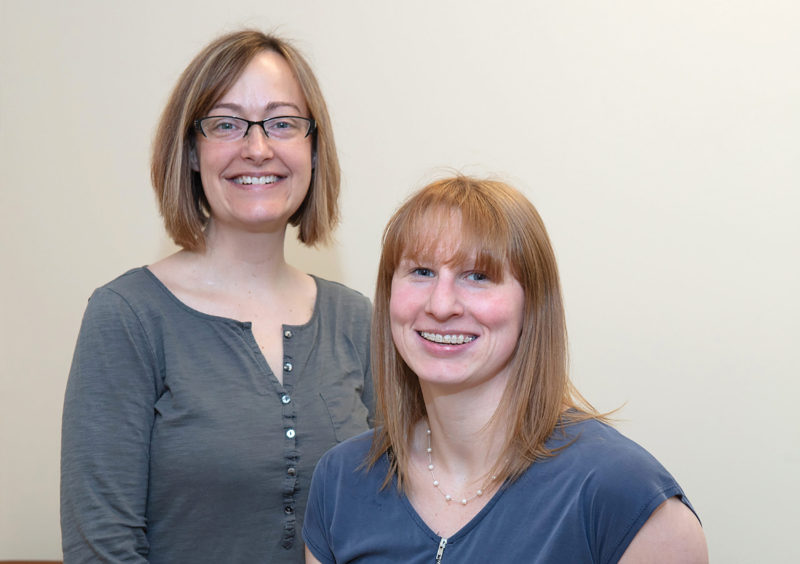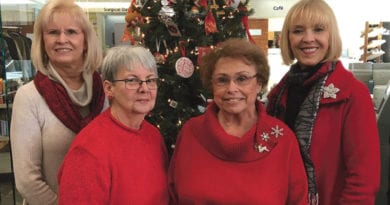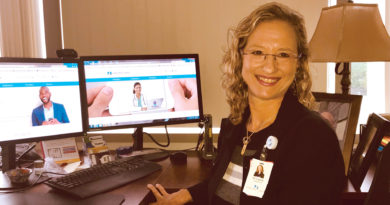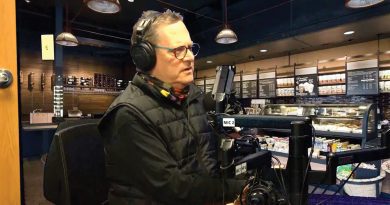Physical Therapist April Rex Volunteers at MHA’s Resource Center
Continuing a Commitment to Service
By KIMBERLEY LEE
April Rex is a U.S. Coast Guard chief boatswain’s mate with more than 25 years of active duty and reserve service. “I joined the Coast Guard at 17 with the idea to go out and make a difference in people’s lives,” she said. That focus on making a difference now also includes her professional practice as a doctor of physical therapy.
“When I left the active-duty Coast Guard after 11 years of service, I knew I wanted to get into a medical care profession,” she recalled. “The truth is, I wanted to be a doctor, but I figured by then I was too old to begin all the years of training. I looked into becoming a physician assistant. When that didn’t work out, I started to explore nursing.”
At a recruiting event, Rex met an admissions official from American International College. “I mentioned how I had wanted to be a doctor and was now looking at becoming a nurse practitioner,” she said. “I remember what she said: ‘applications for the nursing program are already closed for the year, but I can take you into the physical therapy program now — and you’ll be a doctor after all.’ What I truly wanted was to make a difference. It didn’t matter how. And now I am.”
Rex has an office at Open Square in Holyoke, and recently, she began providing volunteer physical-therapy services one day each week to members of the Resource Center, an MHA day program.
“It sounds like a joke when I say I don’t have a plan, but it’s really about what each individual is feeling when they come in.”
“I learned something fascinating about money and success: in order to have either, you have to give a portion away,” she said. “I don’t have a ton of cash to give away, so I give away my skills instead. Volunteering is also an opportunity for me to help people who aren’t able to come to my practice. I want this to feel like another day in the office — it’s just a different office.”
Her one-on-one therapy sessions emphasize gentle hands-on techniques that are tailored to each individual’s needs to improve the way the whole body works. “It sounds like a joke when I say I don’t have a plan, but it’s really about what each individual is feeling when they come in,” Rex said.
The Resource Center primarily serves individuals with brain injury as a result of stroke or accident, said Sara Kyser, vice president of Acquired Brain Injury Programs for MHA. “We also serve those who have significant medical needs but not necessarily a brain injury. This could include people with multiple sclerosis or severe diabetes. For most of our folks, pain is an issue. Their pain is real. Pain pills address the symptoms, but not the underlying causes of pain. But physical therapy can.”
Rex agreed. “Pain doesn’t need to rob you of your life,” she said. “When patients come to me in my practice experiencing pain, I help them understand that they don’t have to live like that. Here at the Resource Center, there is a population that can’t always speak for themselves. If someone can’t walk or toilet themselves or feed themselves, those are things traditional physical therapy can help with. What that means is physical therapists don’t always treat pain first, but I put pain at the top of the list.
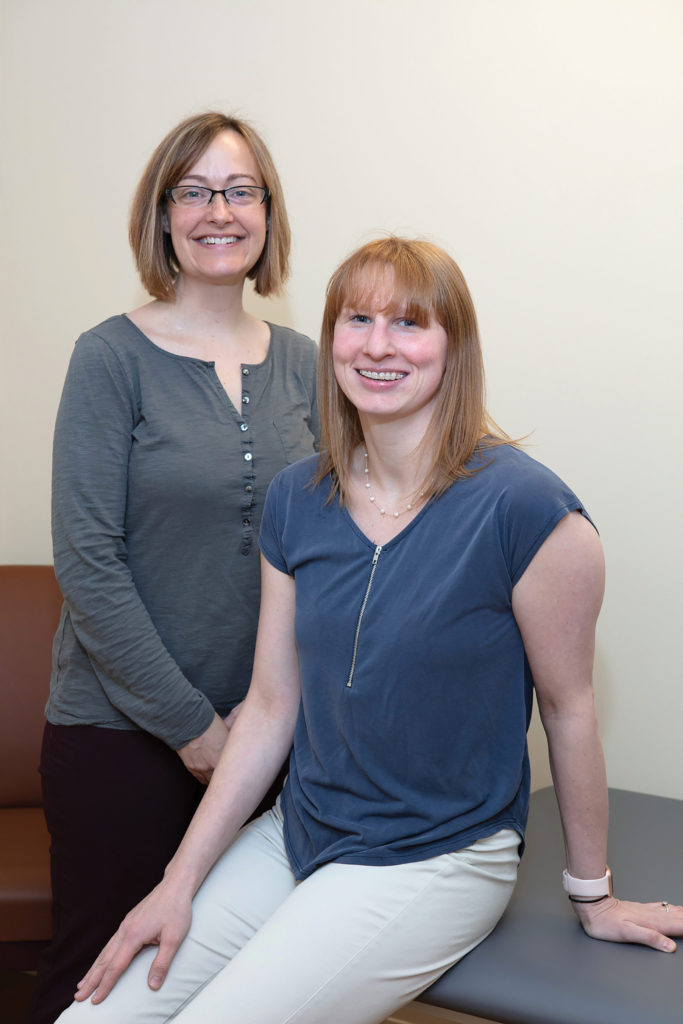
“If I can solve the pain puzzle, everything else can get better,” she went on. “In my mind, it comes down to this: everyone deserves the right to move freely. My role as a physical therapist is to assess patients, look at how well they move, and use my skills to help them move better.”
Kyser noted that no two people are alike when it comes to pain and movement. “People’s goals are unique as well. You can’t just do the same things with everyone. There are no cookie-cutter answers. The daughter of one member said to me about physical therapy for her mother, ‘what’s possible?’ That’s exactly the question we should be asking.”
Body and Mind
Rex does hands-on work and training for physical issues related to posture, body mechanics, balance, and gait. She also helps patients continue training at home with functional exercises to build muscle.
“Our members already can benefit from services including vocational training, the music program, and a variety of ways to regain skills and abilities, and adding a new element through physical therapy allows us to serve more people better.”
“I ask the patient, ‘what do you need help with?’ and we go from there,” she said. “We create a game plan and a partnership, then attack the barriers that are limiting someone from achieving their goals. At the Resource Center, we have private room with a treatment table, but if someone is more comfortable in a wheelchair, I treat them there. I treat each person individually and wholly, every time.”
Human touch is basic to physical therapy, and it helps to build a foundation of trust between the therapist and patient — and that is especially important for people who have an acquired brain injury, Rex noted.
“The population served at the Resource Center is already being touched regularly for transfers or medical purposes, but that is not always the touch of human connection, like hugging or handshakes,” she explained. “With hands-on physical therapy, you know I’m going to touch you, I’m always going to get to know you, and you are gaining my trust as someone who is helpful. The reality is that hands-on physical therapy may be the only time this population gets that kind of touch.”
Physical therapy also has applications for improving emotional wellness. “The veil of depression sinks you down,” Rex said. “You’ll never be able to address physical difficulties successfully if you don’t also address a patient’s emotional outlook.”
For example, one particular PT skill set, cranial sacral therapy, can help with depression, anxiety, and post-traumatic stress disorder.
“It’s a gentle, hands-on technique,” she explained. “I see patients up to eight visits for those treatments, and we keep track of where a patient is at with scores to measure how they are feeling. Whether pain is a result of accident, too much time in a wheelchair, or whatever it may be, if I can bring physical relief, there can be a connection to emotional wellness as well. The power of therapeutic touch doesn’t always have a scientific answer to explain its full outcome.”
Emily Gracewski, Day Supports Coordinator at the Resource Center, said having Rex volunteer is an incredible opportunity.
“Our members already can benefit from services including vocational training, the music program, and a variety of ways to regain skills and abilities, and adding a new element through physical therapy allows us to serve more people better,” Gracewski said. “Our day program has been open for a year, and this is the first time we’ve been able to offer PT on site.”
Rex pointed out that care given at the Resource Center can have impact beyond the person who is cared for directly. “Caregivers are often at a loss not knowing how to help a family member who has suffered a brain injury. If we can improve the patient’s life, then the caregiver’s life also improves. A piece of worry can go away, creating a ripple effect that makes more things better for more people.”
The services Rex provides on a volunteer basis could eventually be offered to Resource Center members as insurance-covered services. Rex’s volunteerism is both a generous personal contribution and part of a longer-term strategy to build a continuum of services for people coming to the Resource Center, including day-program members, participants in MHA programs through its New Way division or Department of Developmental Services division, patients at MHA’s BestLife Emotional Health and Wellness Center, and potentially others.
Making a Difference
In short, it’s a win-win; Rex can be supportive of the work MHA is doing and the people it serves, while MHA has the opportunity to evaluate the various ways physical therapy can be integrated into its programs and services — and the outcomes can provide valuable evidence to justify grants and other funding requests.
“It’s great that MHA is setting the bar a little higher, and I’m glad to be part of it,” Rex said. “I never set out to be a business owner; I set out to do what I love. I wanted to make a difference in people’s lives.”
Kimberley Lee is vice president of Resource Development & Branding at MHA.a

